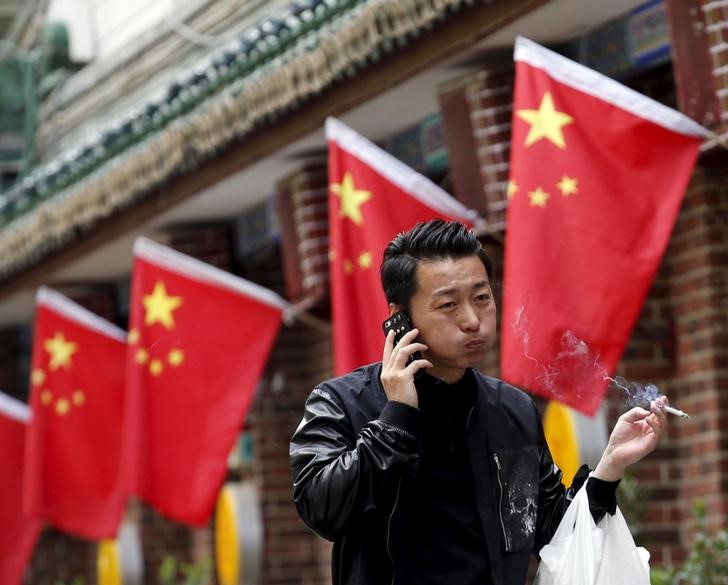By David Lawder
WASHINGTON, Jan 18 (Reuters) - The trade deal that U.S. negotiators are seeking with China may have more in common with a sanctions-monitoring regime than a traditional trade pact.
The administration of U.S. President Donald Trump is pushing China to agree to regular reviews of its compliance as a condition of any trade deal between the world's two biggest economies, according to people familiar with the talks. proposal for reviews is one key way in a U.S.-China deal could differ from typical trade deals across the world, in part because of the deep distrust between their two governments.
Here's a breakdown of the issues that are unique to the bilateral talks:
WILL A DEAL END THE THREAT OF TARIFFS ON CHINESE GOODS?
Not likely. The United States has not made public any offers to lift tarriffs, although negotiators for both nations are working to avoid a scheduled March 2 tariff increase on $200 billion worth of Chinese goods. U.S. officials see the continuing threat of tariffs as the "teeth" in any agreement. The United States alleges that Chinese companies have coerced their U.S. partners into impropertly transferring proprietary technology - an allegation Beijing denies. The demand for frequent compliance reviews reflects frustration among U.S. officials who have complained that China's has failed to follow through on past commitments to implement free-market reforms.
WILL CHINA PURCHASE MORE U.S. GOODS AS PART OF A DEAL?
China has proposed buying additional U.S. services and goods, including soybeans and energy products, people familiar with the talks have said. U.S. Treasury Secretary Steven Mnuchin in December said China had offered to make an additional $1.2 trillion in additional purchases from the United States, and Bloomberg reported Friday that China has proposed purchases that would eliminate the U.S. trade deficit with China by 2024. Economists have argued that significantly reducing the U.S. trade deficit will be difficult, given that the strong American economy and consumer spending means that demand for imports is strengthening. The United States had a $375 billion goods trade deficit with China in 2017, and will likely exceed that for 2018 when final U.S. Census Bureau trade data are released.
HOW DOES THAT DIFFER FROM A NORMAL TRADE NEGOTIATION?
Traditional free trade agreements aim to lower trade barriers between the countries signing them. Typically, they do not include agreements for specific good purchases. These trade deals are built on the assumption that the parties will adhere to the terms of the agreement, with the benefit being increased trade and export opportunities within the free trade zone. The Trump administration imposed new tariffs on Chinese goods to try to force change in China's trade, subsidy and intellectual property practices - similar to financial sanctions that the United States has imposed on foreign entities to increase pressure on their governments for changes in behavior or policies.
Such sanctions are typically lifted only after the desired changes are verified by the U.S. Treasury Department. The Treasury has said, for instance, it will lift delayed sanctions on Russian aluminum company Rusal 0486.HK after Russian oligarch Oleg Deripaska reduces his stake in Rusal and relinquishes control of the company. ARE TRADITIONAL TRADE AGREEMENTS ENFORCED?
Many free trade deals have built-in dispute settlement mechanisms for state-to-state disagreements over rule compliance, disputes between private investors and governments, or allegations of unfair anti-dumping and anti-subsidy duties. Arbitration panels often hear arguments from both sides, operating like a court. Canada, for example, has brought challenges to U.S. anti-subsidy duties on softwood lumber before panels set up under NAFTA's Chapter 19, a mechanism that would be continued if the new U.S.-Mexico-Canada Agreement (USMCA) if ratified. If Mexico fails to implement effective labor reforms, the United States and Canada could seek redress through arbitration. But critics, including many Democrats in Congress, argue that this enforcement mechanism is weak and largely untested.
CAN'T COUNTRIES SEEK RELIEF AT THE WORLD TRADE ORGANIZATION?
The WTO's 164 members can challenge each other over unwarranted trade restrictions, illegal subsidies and other unfair practices and seek resolution through dispute settlement panels. But this process is seen as slow, and its decisions too easy for countries to ignore. The United States has argued that the WTO has failed to rein in China's unfair practices, so it has acted on its own to force change in China. The WTO's appellate body also could grind to a halt this year as Washington is currently blocking the appointment of judges. Because three judges are needed to rule on appeals, the system could break down when two judges' terms expire in December 2019.
CAN COUNTRIES JUST QUIT TRADE DEALS THEY DON'T LIKE?
Yes, most trade pacts have provisions for termination, but this has never been tested by the United States. President Trump frequently threatened to quit NAFTA during negotiations last year, and his administration has considered issuing a six-month withdrawal notice as a tactic to pressure Congress into approving the trade deal that would replace it. But some U.S. lawmakers and legal experts argue that Trump may not have authority to quit the agreement without Congress' approval because the U.S. Constitution grants Congress explicit power to regulate commerce with foreign nations. Any move to quit NAFTA is likely to draw a court challenge. EXCLUSIVE-U.S. demands regular review of China trade reform progress
